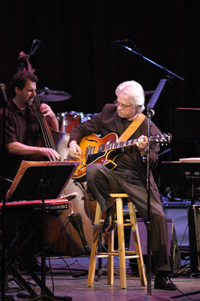
Steve Rochinski
For media inquiries, please contact Media Relations
Steve Rochinski is a professor in the Harmony Department at Berklee College of Music. An accomplished guitarist, recording artist, and internationally known performer and clinician, he has received numerous grants and awards, including a 1993 Jazz Fellowship from the National Endowment for the Arts for private study with Tal Farlow.
Before coming to Berklee, Rochinski toured for many years, workign with the Candoli Brothers, Tal Farlow, Attila Zoller, Jimmy Raney, Tim Hagans, Pat Harbison, Gary Foster, Hank Marr, and many others. In 1995, he released the critically acclaimed album Until Further Notice. He currently records for Jardis Records, Germany's leading jazz guitar label. His releases include A Bird in the Hand and Otherwise.
Rochinski is the author of the award-winning The Jazz Style of Tal Farlow: The Elements of Bebop Guitar and the Motivic Basis for Jazz Guitar Improvisation. In November 2001, he was featured in Just Jazz Guitar magazine.
- Guitarist, arranger, and music director for The Anthony Tillman Show
- Guitarist with Pete and Conte Candoli, Tim Hagans, Bob Dogan, and Pat Harbison
- Concert appearances with Gary Foster, Tal Farlow, Attila Zoller, and Jimmy Raney
- Clinician with Tal Farlow
- Author of The Jazz Style of Tal Farlow
- Jardis Records recording artist
- Internationally active performer/clinician
- Recipient of National Endowment for the Arts (NEA) Fellowship
